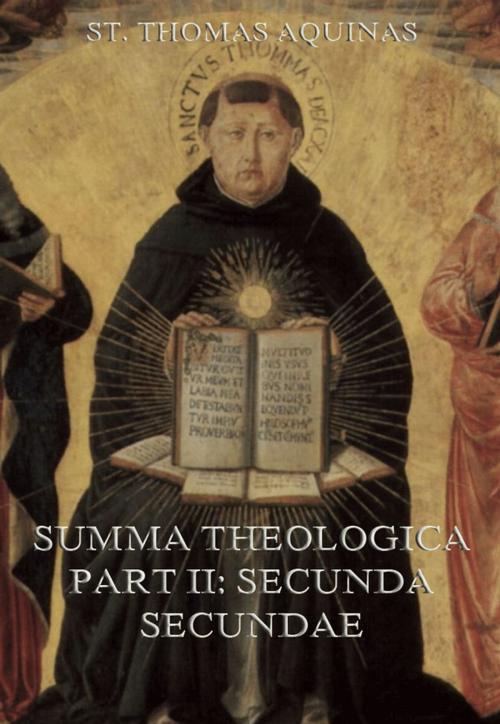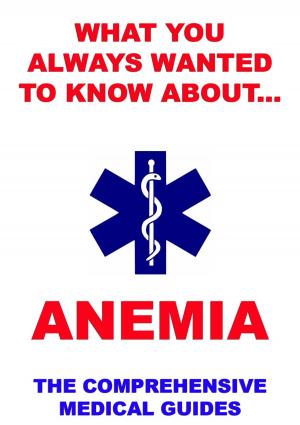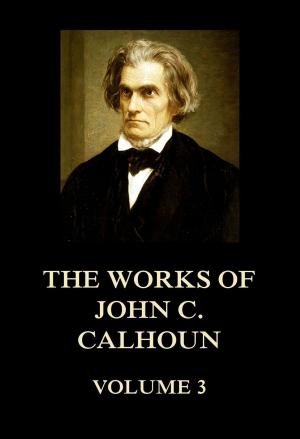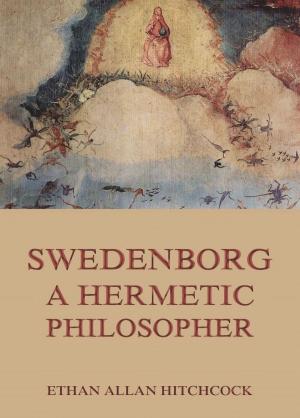Summa Theologica Part II ("Secunda Secundae")
Nonfiction, Religion & Spirituality, Philosophy, Religious, Theology, Christianity| Author: | St. Thomas Aquinas | ISBN: | 9783849620899 |
| Publisher: | Jazzybee Verlag | Publication: | July 21, 2012 |
| Imprint: | Language: | English |
| Author: | St. Thomas Aquinas |
| ISBN: | 9783849620899 |
| Publisher: | Jazzybee Verlag |
| Publication: | July 21, 2012 |
| Imprint: | |
| Language: | English |
The Summa Theologiae (Latin: Compendium of Theology or Theological Compendium; also subsequently called the Summa Theologica or simply the Summa, written 1265-1274) is the best-known work of Thomas Aquinas (c.1225-1274), and although unfinished, "one of the classics of the history of philosophy and one of the most influential works of Western literature." It is intended as a manual for beginners in theology and a compendium of all of the main theological teachings of the Church. It presents the reasoning for almost all points of Christian theology in the West. The Summa's topics follow a cycle: the existence of God; Creation, Man; Man's purpose; Christ; the Sacraments; and back to God. (courtesy of wikipedia.com). This is part 2-2, 'Secunda Secundae'. In a chain of acts of will, man strives for the highest end. They are free acts, insofar as man has in himself the knowledge of their end (and therein the principle of action). In that the will wills the end, it wills also the appropriate means, chooses freely and completes the consensus. Whether the act be good or evil depends on the end. The "human reason" pronounces judgment concerning the character of the end; it is, therefore, the law for action. Human acts, however, are meritorious insofar as they promote the purpose of God and his honor. By repeating a good action, man acquires a moral habit or a quality which enables him to do the good gladly and easily. This is true, however, only of the intellectual and moral virtues (which Aquinas treats after the manner of Aristotle); the theological virtues are imparted by God to man as a "disposition", from which the acts here proceed; while they strengthen, they do not form it. The "disposition" of evil is the opposite alternative. An act becomes evil through deviation from the reason, and from divine moral law.
The Summa Theologiae (Latin: Compendium of Theology or Theological Compendium; also subsequently called the Summa Theologica or simply the Summa, written 1265-1274) is the best-known work of Thomas Aquinas (c.1225-1274), and although unfinished, "one of the classics of the history of philosophy and one of the most influential works of Western literature." It is intended as a manual for beginners in theology and a compendium of all of the main theological teachings of the Church. It presents the reasoning for almost all points of Christian theology in the West. The Summa's topics follow a cycle: the existence of God; Creation, Man; Man's purpose; Christ; the Sacraments; and back to God. (courtesy of wikipedia.com). This is part 2-2, 'Secunda Secundae'. In a chain of acts of will, man strives for the highest end. They are free acts, insofar as man has in himself the knowledge of their end (and therein the principle of action). In that the will wills the end, it wills also the appropriate means, chooses freely and completes the consensus. Whether the act be good or evil depends on the end. The "human reason" pronounces judgment concerning the character of the end; it is, therefore, the law for action. Human acts, however, are meritorious insofar as they promote the purpose of God and his honor. By repeating a good action, man acquires a moral habit or a quality which enables him to do the good gladly and easily. This is true, however, only of the intellectual and moral virtues (which Aquinas treats after the manner of Aristotle); the theological virtues are imparted by God to man as a "disposition", from which the acts here proceed; while they strengthen, they do not form it. The "disposition" of evil is the opposite alternative. An act becomes evil through deviation from the reason, and from divine moral law.















